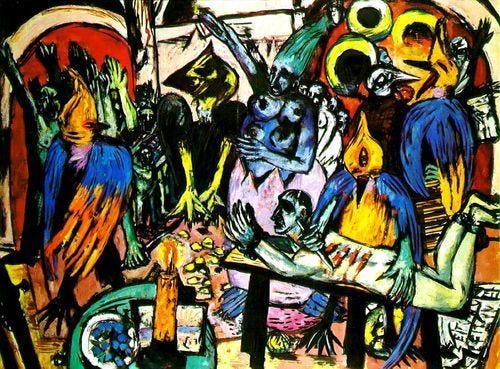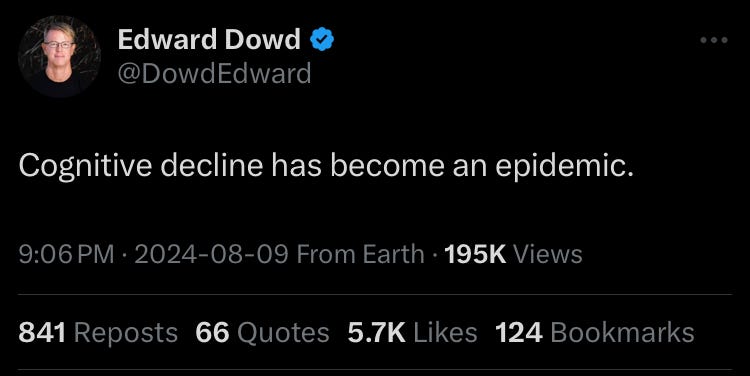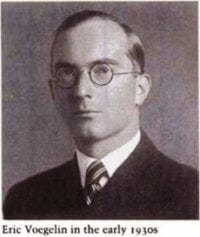A person could be forgiven for concluding that an unhealthy portion of us have lost their minds. On life-support throughout COVID, the capacity for critical thought has made, at best, a halting recovery. In our governing classes above all, we find a marked inability—or unwillingness—to think.

Consider three exhibits from the past month alone:
The 2024 Paris Olympics: Two biological male boxers pummel a series of female boxers, with express support from the International Olympic Committee and to wild cheers from crowds. After winning the gold medal match, one of the boxers is hoisted onto a coach’s shoulders and carried through the arena in a way no Algerian woman would be. The aggrieved gold medalist has commenced a legal action against X for “misogynistic, racist and sexist” cyberbullying.
The United States presidential election: The legacy media pronounces 81-year-old Democrat candidate Joe Biden as in top cognitive form until the day he is deemed senile. Kamala Harris, current vice-president and Biden’s replacement candidate, is installed via operations unknown to Federal Election Commission law. After an intensive media cleanse, the Vice-President—a terrible campaigner who helped conceal the President’s mental state—is said to lead in the polls.
Meanwhile in Lethbridge: The remaining two of the Coutts Four are found “not guilty” of conspiracy to commit murder of a police officer in a jury trial. Held over 900 days without bail, the two men face further incarceration because the Crown, strangely, has appealed the acquittal. True to form, the Canadian media continues to allow the prolonged jail time to pass without comment. Nor does it mention that the Crown’s case to invoke the Emergencies Act in February 2022 disintegrated with that “not-guilty” verdict.
Beyond these three, we could mention many other acts and omissions: the inflammatory reaction of the U.K. government to tweets about immigration, for example; or the inaction of political leaders in the face of violent anti-semitic attacks; or the denial of firearms permits to members of Germany’s second-most popular political party, Alternative fuer Deutschland.
The list is long.
Where is the rationality of such actions? Where the proportionality? And where the challenge from the media, a group Gord Magill of Autonomous Truck(er)s has dubbed “regime stenographers?”
Fellow Domer Edward Dowd put it well in an X post recently:
Which puts us all in a dangerous place.
We know the symptom, but not yet the cause.
A rational course would be to consult thinkers who have seen this before. Here, we should bear in mind the caution of a past post not to conflate distinct historical eras—and certainly not for rhetorical effect. The purpose rather is to discern lessons, even “best practices” to help address the maladies of our own time.
Hannah Arendt and Eric Voegelin were two political philosophers who observed first-hand the descent of Germany and Austria into collective pathology in the 1920s and ’30s. Their work helps to inform both diagnosis and remedy, and will be taken up in the next post too.
Hannah Arendt on ideological thinking
Some of the most astute commentators on the COVID era relied extensively on Hannah Arendt’s work. Little wonder: Arendt was a gifted theorist of twentieth-century totalitarian dictatorships. In the 1920s, she witnessed the early signals of a regime of this type as she completed her graduate studies with philosophers Martin Heidegger in Marburg and Karl Jaspers in Heidelberg.
A German Jew, Arendt fled Germany in 1933. Her escape to the United States via Prague, Geneva, and Paris allowed her to survive the war. Once safely in the United States, she could begin analyzing what had happened. The danger of both the Nazi regime and Communism in the Soviet Union, in her view, was not solely—or even primarily—a naked hunger for power but their strict, literal adherence to their respective ideologies.
Arendt’s 1953 article, “Ideology and Terror: A Novel Form of Government,” defines ideology as “quite literally what its name indicates: it is the logic of an idea” (316). Whether of race, class, or another idea, its logic is applied to all human history:
Its subject matter is history to which the “idea” is applied; the result of this application is not a body of statements about something that is, but the unfolding of a process which is in constant change. The ideology treats the course of events as though it followed the same “law” as the logical exposition of its “idea” (316).
No past event can escape explanation by the ideology. It also explains present and future events, setting out a program of action to realize them. Totalitarian leaders are most diligent of all, orchestrating the murders of whole categories of people to fulfill the ideology’s “iron logic.” Thus Arendt on two exemplary ideologues, Stalin and Hitler:
a “dying class” consisted of people condemned to death; races that are “unfit to live” were to be exterminated. Whoever agreed that there are such things as “dying classes” and did not draw the consequence of killing their members, or that the right to live had something to do with race and did not draw the consequence of killing “unfit races,” was plainly either stupid or a coward (318).
Totalitarian ideologues represent the limit case, of course. And yet the logic Arendt describes indeed fits some of the contemporary examples above. Take the boxer at the Paris Olympics: as a biological male, the boxer is physically much stronger than other women. Yet gender ideology is at play. And according to the logic of the gender idea, that boxer not only can but should fight biological females to promote the progress of gender inclusivity in history. Any concerns for the fairness of the fight, or the safety of female boxers, or the future of females competing in elite sport, are beyond the scope of the idea. They are therefore dismissed, even punished as “hate.” In the event, the sole female athlete who stopped her match with this boxer later felt compelled to apologize, beyond losing her shot at an Olympic medal.
To those who don’t subscribe to gender ideology, all this may seem unreal. And in a fundamental sense, it is. The actions and their effects are real enough, but they make sense only in terms of the alternative reality that gender ideologues aim to create.
Such actions, however, are based in a category error. By contrast to math or hard sciences, Arendt submits, the causes behind events in human history are too messy and mysterious to be reduced to a single system.
The lessons here? Following the logic of a single idea leads us down a dangerous path, up to and including mass extermination. If we are to reject ideological thinking, it is at the level of premises. Specifically, we can insist:
Human history cannot be attributed to the unfolding of a single idea.
Deducing from said idea as a premise is not a suitable guide for action.
Before leaving Arendt, she raised one disturbing aspect of Nazi Germany in a 1964 lecture, “Personal Responsibility Under a Dictatorship.” It involved the conduct of those who weren’t convinced Nazis, but who went along anyway:
The moral issue arose only with the phenomenon of “coordination,” that is, not with fear-inspired hypocrisy, but with this very early eagerness not to miss the train of History, with this, as it were, honest overnight change of opinion that befell a great majority of public figures in all walks of life and all ramifications of culture, accompanied, as it was, by an incredible ease with which lifelong friendships were broken and discarded. In brief, what disturbed us was the behavior not of our enemies but of our friends, who had done nothing to bring this situation about. They were not responsible for the Nazis, they were only impressed by the Nazi success and unable to pit their own judgment against the verdict of History, as they read it (24).
Individual Germans failed to use their own lights, in other words—and the whole society suffered for it.
Eric Voegelin mocks the Nazis
Many know of Hannah Arendt’s work. Fewer know of her contemporary, political philosopher Eric Voegelin. Voegelin also witnessed the events up close, though in Austria before the Anschluss. An ambitious young legal scholar, Voegelin was steeped in the same academic tradition Arendt was. He was assistant to legal philosopher Hans Kelsen in the 1920s, and taught at the University of Vienna in the 1930s.
Unlike Arendt, Voegelin was not a Jew. Yet he was steadfast in his confidence that the National Socialists were spiritually and intellectually corrupt. Having written two books on race ideology, Voegelin also wrote a book where he analyzed National Socialism as a modern “political religion.”
He is worth studying for his personal conduct too. In fact, the young lecturer might be seen as a foil to the enthusiastic Nazi fellow-traveller Arendt described as the norm, even as a study in “how it’s done.”
Bruno Schlesinger was one of Voegelin’s law students in the 1930s. Sixty years later, he recalled the situation in Austria at the time:
You see, it was a very heated atmosphere. The Nazis were on our doorstep, and there was enormous pressure to legalize the Nazi Party, which had been outlawed in Austria. So there was propaganda and terroristic acts and a very feverish atmosphere among many of the students. Most of them were nationalistic by education, anyway. And of course, there was the increasing pressure coming from Nazi Germany. In 1934, Dollfuss, the chancellor of Austria, was assassinated, and there was increased pressure from the one side to control the Nazis. On the other, the Nazis were increasing their pressure to put their theories into force. There were terroristic acts: telephone booths, for example, were blown to bits. . . .
This was the terribly destabilized atmosphere in which I started his class (Voegelin Recollected, 227).
Another student was Heinz Barazon, a Jew who managed to emigrate to Palestine in 1938. Barazon also recalled the tense atmosphere. Even before the Anschluss, he said, most professors were unwilling to critique the regime:
Brutal, the Austrian Fascists were not, or only occasionally. But they were not cozy either. After the Anschluss, of course, critical statements endangered one’s life. But even between ’34 and ’38, one could suffer disadvantage if one criticized the regime. There was even at that time a containment camp south of Vienna where politically persecuted people were detained—both reds and Nazis (227).
In this charged context, Voegelin delivered his lectures—ones Barazon described as “always refreshingly truthful; they were often also very funny compared to the atmosphere that prevailed at the Vienna university at that time” (226).
Schlesinger stressed that the lecture hall also contained many Nazis:
And I often wondered about them: Voegelin always let loose these barbs against the Nazi constitution, against the laws they introduced, but they remained quiet. Why? In some ways, I think, it was because they didn’t understand what he was talking about. Because he didn’t in any way denounce the Nazis; there was no kind of lashing out at them. It was almost a kind of bantering about them instead. He would even smile as he said it: “Have you heard this and this?” There wasn’t really any accusation, so I think some of them didn’t know what he was talking about. . . . I thought that they would break into a demonstration at one time or another, but they didn’t. I thought they would start demonstrating against the government, or beating up on non-Nazi and Jewish students, but it never happened.
But Voegelin seemed to have gotten a lot of fun out of the situation, too. With a smile, he would mildly insinuate this or that and indicate that it was absolutely stupid or unlawful. He didn’t say that they were stupid directly, of course: he just said, “Can you imagine it? They have done this and that.” (228-29).
The actions of his teacher made a lasting impression, even sixty years later:
It was an amazing experience, actually. I have never seen anything quite like it; it was really dangerous. Because at least some of them understood. At least a few knew what he was driving at, but he kept going (229).
Until one day, he was gone.
On March 12, 1938, the Germans marched into Austria. The next day, Voegelin was fired from the university. A few months later, his wife reported, the Gestapo came to confiscate his passport. The two escaped via Switzerland to the United States.
The Christmas letter they sent in 1939 made it clear they were the exception in their family, which had also been “swept up” in the events of the era. After recounting the awful experiences of several friends, many of them Jews, the letter concluded:
The entire Austrian elite has been completely destroyed, and nothing more of this branch of Germanness remains today beyond the worst sort of rabble, the ones who collect the loot (252) .
Hannah Arendt and Eric Voegelin dared to continue thinking in a dangerous time. Both suffered upheaval of their livelihoods and career prospects—not to mention the breaks with friends and family and loss of loved ones to ideological pathology. By the 1960s, though, part of their draw for young students was their unimpeachable conduct in that period.
Almost thirty years later, German society had not yet recovered morally—as both thinkers again made clear. In 1963, Hannah Arendt published Eichmann in Jerusalem: A Report on the Banality of Evil. Eric Voegelin, by that time a professor at the University of Munich, delivered a series of lectures, “Hitler and the Germans” in 1964.
The next post will address that later work—and above all, the path to recovery it set out.
Further Reading
Hannah Arendt, “Ideology and Terror: A Novel Form of Government.” The Review of Politics, Vol. 15, No. 3 (July 1953): 303-327.
Hannah Arendt, “Personal Responsibility Under a Dictatorship.” Essay based on a lecture delivered in 1964.
Barry Cooper and Jodi Bruhn, eds. Voegelin Recollected: Conversations on a Life. Columbia: University of Missouri Press, 2008.
Eric Voegelin, “The Political Religions.” In Manfred Henningsen, ed. Modernity Without Restraint: The Political Religions, The New Science of Politics, and Science, Politics, and Gnosticism. Columbia: University of Missouri Press, 1999.






“Almost thirty years later, German society had not yet recovered morally—as both thinkers again made clear.”
Is it going to take that long for the Branch Covidians to come to their senses?
One wonders!
What a fine essay. Thank you!